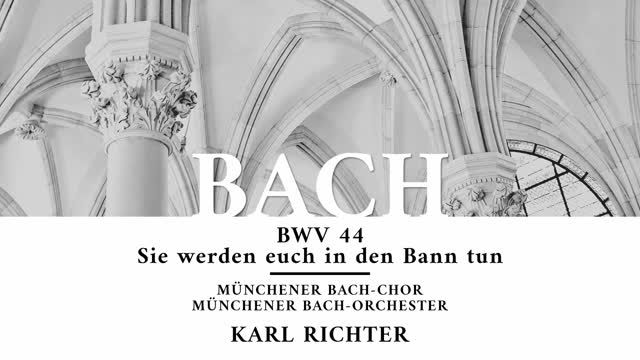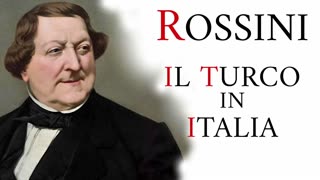Premium Only Content

Cantata BWV 44, Sie werden euch in den Bann tun - Johann Sebastian Bach "Karl Richter"
🎻 Enjoy the music. Please follow, like & comment, this is immensely appreciated 🎻
Composition Year: 1724 in Leipzig
First Performance: 1724-05-21 in Leipzig
Dedication: 6th Sunday after Easter (Exaudi)
Performers: Edith Mathis - Sopran • Anna Reynold - Alt • Dietrich Fischer-Dieskau - Bas • Münchener Bach-Chor • Münchener Bach-Orchester • Karl Richter - Conductor
Recorded: München, Herkulessaal, 10/1973; 1&2/1974; 1/1975
Recording quality: High
~
1. Duet (tenor, bass): Sie werden euch in den Bann tun
2. Chorus: Es Kömmt aber die Zeit
3. Aria (alto): Christen müssen auf der Erden
4. Choral (tenor): Ach Gott, wie manches Herzeleid
5. Recitativo (bass): Es sucht der Antichrist
6. Aria (soprano): Es ist und bleibt der Christen Trost
7. Chorale: So sei nun, Seele, deine
~
Work:
Sie werden euch in den Bann tun (They will put you under banishment), BWV 44, is a church cantata by Johann Sebastian Bach. He composed it in Leipzig for Exaudi, the Sunday after Ascension, and first performed it on 21 May 1724.
~
History and words:
Bach wrote the cantata in his first year in Leipzig for the Sunday Exaudi, the Sunday after Ascension. The prescribed readings for the Sunday were from the First Epistle of Peter, "serve each other" (1 Peter 4:8–11), and from the second Farewell discourse in the Gospel of John, the promise of the Paraclete, the "Spirit of Truth", and the announcement of persecution (John 15:26–16:4). The unknown poet begins with a quotation from the Gospel. One year later, poet Christiana Mariana von Ziegler would begin her cantata text for the same occasion, Sie werden euch in den Bann tun, BWV 183, with the same quotation, but other than that, the two works have little in common. The poet reflects the persecution of the Christians,[1] confirmed by a chorale as movement 4, the first stanza of Martin Moller's "Ach Gott, wie manches Herzeleid". In movement 5 the poet gives a reason, the Antichrist even thinking to work for God by fighting the Christians and their teaching. In movement 6, the suffering ones are promised God's help. The closing chorale is the final stanza of Paul Fleming's "In allen meinen Taten".
~
Bach first performed the cantata on 21 May 1724. It is the last original cantata composition of his first annual cycle, followed by reworkings of older music until the beginning of the second annual cycle of chorale cantatas on the first Sunday after Trinity.
~
Extended info on Bach and his work: https://www.bach-cantatas.com/
~
***
If you have the means and desire to contribute to this channel, you can Buy Me a Tea - https://ko-fi.com/classicalmusicpd
***
~
ATTRIBUTION
Music contained in this video is licensed to: Archiv Produktion, Germany.
-
 2:26:27
2:26:27
Classical Music P.D.
1 year agoIl Turco in Italia 'Opera in 2 Acts' - Giochino Rossini 'Ramey, Caballe, Chailly - Live, 1981'
205 -
 31:39
31:39
Peter Santenello
1 year agoStories From Vegas' Golden Era 🇺🇸
6.84K5 -
 LIVE
LIVE
The Why Files
6 hours agoLIVE: The Why Files 24/7 Stream n' Chat
1,649 watching -
 55:15
55:15
Russell Brand
23 hours agoThe Truth About Big Pharma & COVID with Dr. Aseem Malhotra
127K6 -
 1:19:48
1:19:48
The Rubin Report
6 hours agoWhat the Trump Administration Must Do Instead of Revenge | Peter Thiel
70.8K87 -
 1:59:00
1:59:00
Steve-O's Wild Ride! Podcast
3 days ago $33.79 earnedPatrick Bet-David DESTROYS Steve-O's Dad - Wild Ride #252
116K43 -
![[XboxONE] GRINDING 1000g FC24](https://1a-1791.com/video/fwe1/01/s8/1/y/k/I/o/ykIoy.0kob-small-XboxONE-GRINDING-1000g-FC24.jpg) 3:29:15
3:29:15
deathbee
10 hours ago[XboxONE] GRINDING 1000g FC24
77.8K4 -
 1:08:32
1:08:32
Winston Marshall
1 day agoThe HIDDEN Agenda: Congresswoman Hageman UNCOVERS USAID Fraud, Censorship and Human Trafficking
107K125 -
 8:16
8:16
CarlCrusher
23 hours agoThe True Story of Stranger Things and the Montauk Project Origins
62.8K12 -
 10:05
10:05
ariellescarcella
1 day agoNo, You're Not Having A 'Gender Crisis' You're Just Bored
60.9K37